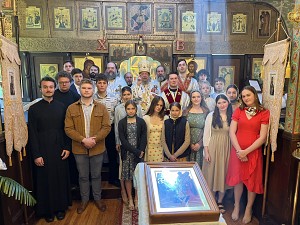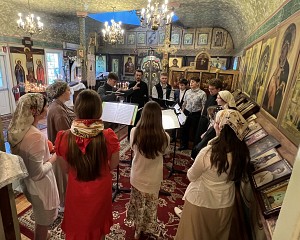On Saturday the 6th and Sunday the 7th of May, the Sunday of the Paralytic, the Youth Choir – under the direction of Gregory Ivanov – sang at the All-Night Vigil and Divine Liturgy in the Nativity of the Mother of God Church at the New Kursk Root Hermitage in Mahopac, NY.
On Saturday, the choir arrived in the later afternoon for a rehearsal and luncheon organized by the sisterhood. At Vigil, Bishop Jerome (Shaw) was joined by the rector of the New Kursk Root Hermitage, Priest George Temidis, and Deacons Alexey Pnev and Konstantin Aleshin. Among those praying in church were guests from Nyack, Novo-Diveevo, and Brooklyn.
It was a quiet May evening out, the lilac and jasmine were fragrant, and the sun gilded the clouds in the evening sky with its warm rays. "On earth peace, goodwill among men. We praise Thee, we bless Thee, we worship Thee, we glorify Thee, we give thanks to Thee for Thy great glory," the choir sings beautifully, calmly, and easily.
Fifteen young people – six young men and nine young women, all aged 13-23, came at the invitation of the Hermitage to sing the Vigil and Liturgy in a parish unfamiliar to them, because they love to sing in church and want to venerate the local icons and relics and learn about the history of the New Kursk Root Hermitage. Directing the choir is Gregory Ivanov ‒ son of Archpriest Paul Ivanov, rector of Holy Myrrhbearers Church in Brooklyn. This is the choir’s fourth serious trip, after Holy Myrrhbearers Church, St. Vladimir Memorial Church in Jackson, NJ, and St. Seraphim Memorial Church in Sea Cliff, NY. The question poses itself: who are these young people and why are they voluntarily giving up their free time to church singing? We were able to speak with them the following day, but more on that later. After dinner in the church hall, the singers left to spend the night with various parish families.
On Sunday morning, the choir gathered for a short rehearsal in the parish hall. After the reading of the Hours, the greeting of His Grace, Bishop Jerome, took place to the solemn peal of bells. Concelebrating with His Grace were the above-mentioned Frs. George, Alexey, and Konstantin, as well as Deacon Theodotus Conrad.
"Let us who mystically represent the Cherubim and who sing the thrice-holy hymn to the Life-creating Trinity," the choir sang slowly and attentively, without a hint of affectation, concentrated and sublime. The sunlight poured in in streams from under the cupola, the smoke from the incense swirled whimsically in the columns of light, the bells on the deacon’s censer softly chimed. It seemed like time had frozen in place… Most of the people in church approached to receive the dread Holy Mysteries of Christ.
In his sermon in two languages, Bishop Jerome touched on the great miracles described in the Sunday Gospel and Epistle readings: the healing of the paralytic and the raising of Righteous Tabitha, and to the oft-posted question, why there are no more such great miracles in our time, responded that this is due to the weak faith in God of the world around us. God knows all, including the wickedness of man; if great miracles were to appear now, then there would absolutely be those who would try to attribute them to simple scientific explanations, when in reality we need miracles for the strengthening of our faith. And while in the Western world the so-called ‘faith’ in atheism spreads ever further, nevertheless among our people there is a clear desire to believe in God. Our Orthodox Church attracts people to Herself through the beauty and solemnity of the divine services, the architecture of the churches, the beautiful singing, the splendid icons, the joyous mood; but all of this is, of course, insufficient. The firm foundation of all of this must absolutely be faith in God.
After the service, the parishioners, choir, visitors, and pilgrims sat down to lunch in the church hall and outdoors. A bountiful luncheon was prepared by the efforts of parishioners, and was in part a memorial repast for the newly departed servant of God Serge, prepared by his family. The weather was warm, the birds chirped, the vernal sun shone brightly, no one wanted to depart, and we had an opportunity to chat with the youth.
The young people told us that they are calling themselves the Youth Choir temporarily, until they come up with a real name. Grisha Ivanov and Alesha Temidis were fired up with the idea of creating a church youth choir soon after the All North American Youth Conference that had taken place in Utah in the summer of 2022, which inspired them with the history of the previously extant Russian Choral Society in the U.S. They wanted to create something similar, but to primarily remain a church choir.
Grisha explained: "We are trying to preserve and relay to others our Russian tradition of choral singing and the Orthodox divine services. Our main goal is to show the youth how to sing the Vigil and Liturgy, specifically: to be familiar with Church hymnography, to be able to read well in church and know the rubrics. When in the future adult life will scattered us across various cities and states, we must be able to organize and direct church choirs in the parishes wherever needed."
Also singing in the Youth Choir are:
- four altos: Matrona Kallaur (St. Seraphim parish in Sea Cliff), Katherine Mikaelian (Holy Myrrhbearers parish in Brooklyn), Ekaterina Olhovsky (St. Vladimir Memorial Church in Jackson), and Nicole Koshkin (from Brooklyn),
- three sopranos: Maryana Olhovsky and Anya Ledkovsky (from Jackson) and Nastya Borschevsky (from Brooklyn),
- three tenors: Alexei Orloff (from Los Angeles, currently studying at Holy Trinity Seminary in Jordanville, NY), Martha Ledkovsky (from Jackson), and Maria Mikaelian (from Brooklyn), and
- four basses: Reader Alexei Temidis (New Kursk Root Hermitage), Feodor Ledkovsky (from Jackson), John Pavuk (from Jordanville), and Paul Ivanov (from Brooklyn).
Grisha became a choir director almost by accident: so it was during the coronavirus pandemic that there was no one to direct the parish choir, and Grisha’s father, the rector, Fr. Paul, found a solution by asking his son to take over the choir "just once a month." Grisha recalls how he reluctantly agreed then, but was later got more involved, and he enjoyed it. Music interested him so much that after two years of study at a financial university, he is seriously considering the possibility of receiving a musical education.
Presently, the Youth Choir is working with church music compositions from the 18th, 19th, and 21st centuries, and to a lesser extent for now, the 20th: Arkhangelsky, Turchaninov, Lvovsky, Protodeacon Pyotr Kozlovsky, Metropolitan Hilarion (Alfeyev); from among the Diasporan composers – B.M. Ledkovsky and M.S. Konstantinov.
In order to plan a visit to a church to sing, Grisha coordinates for roughly two months with the host parish, agrees on dates with the singers, and sends them all notes ahead of time for individual preparation; then, about one week before the trip, the singers meet for a two-hour rehearsal. On the appointed Saturday, they arrive at the host parish in the afternoon, hold an hour-and-a-half rehearsal, and after a meal and a short rest head to the church to sing the Vigil, and Liturgy on Sunday morning. "This is all voluntary," Grisha explains. "Everyone takes on the responsibility to learn the notes, to come to the rehearsal and the services, often from afar. We are wonderfully received everywhere."
The young men and women sit at a table outside, laughing, talking with one another, enjoying ice cream. Answering the question why they decided to dedicate part of their free time to singing in the Youth Choir, they smile. "I just love to sing," answers Martha. "And I love the fellowship!", adds Nicole. Katya explains "We, the youth, started singing in our parish in Brooklyn, it was interesting for us. Our choir is for those who love singing, so that those who have the talent and the desire can expand on them."
The answers start coming all at once now. "I do this so that I can grow musically, learn new things, gain experience in church singing and the divine services." "Our parents, parishes, and teachers give us so much. Singing in the choir is our opportunity to express our gratitude for that, to do our part. For example, when balls, camps, conferences are organized, this is all other people doing something for us. But here we are the choir, this is our own thing." "We are Orthodox youth, there aren’t that many of us! We try to stay together. Singing in the church choir brings us closer."
Masha conducts music classes by herself in her parish for children ages 6-7: basics of solfège and essential hymns for church. Asked why she does this, she answers seriously: "We see with our own eyes how the older generation is passing away, and now it is our turn. We are not even the future "shift," we are already continuing their work, here and now."
It seems so remarkably simple how easily these young people speak about important things, including understanding things that not even every adult can comprehend and express! The youngest singer is 13, the oldest is 23. The director, Grisha Ivanov, is 19. Among the singers are junior high, high school, and college students, one seminarian, and a kindergarten teacher. All of the choir members without exception were born in the U.S., their families having emigrated from Russia, Belarus, Georgia, Albania. Answering the question what they like to do in their spare time, they laugh cheerfully: all sorts of things! Working out at the gym and hiking in the Adirondacks, swimming and bodybuilding, getting doused with cold water, hockey and basketball, gymnastics and ballet, playing the piano and experimenting in the kitchen, and much more!
And what do these young men and women want to grow up to be? The answers pour forth: a teacher, a physicist, a baker – but with his or her own bakery! ‒ a gym owner, a businessman, an interior decorator, a musician. And then another answer pops up quietly and a little shyly: a wife. Everyone smiled, knowing who said it, but half-jokingly worried that if word gets out, she won’t be able to beat back all of the seminarians!
After lunch and a short rest, parish rector Fr. George led all of the singers into the church and then through the grounds of the New Kursk Root Hermitage, telling them about the history of this place, beginning in 1950. With unfeigned interest, the youth listened to the history and venerated the icons and relics, including a local wonderworking copy of the Kursk Root Icon, an old hand-embroidered Shroud, an icon carved from a piece of the Oak of Mamre, an embroidered cap belonging to St. John of Kronstadt, a reliquary with pieces of the relics of the saints of the Near and Far Caves of the Kiev Caves Lavra and Mount Athos, brought by the founder of the New Kursk Root Hermitage – Archbishop Seraphim (Ivanov; +1987).
The time came to bid farewell and depart. The hall was cleaned up, the lampadas in the church extinguished, sincere words of gratitude and farewell exchanged, and cars packed up. Everyone left for home, taking with them in their hearts good impressions and joy from these remarkable two days spent together.
Matushka Elizaveta Temidis
Mahopac, NY: Youth Choir sings Divine Services at New Kursk Root Hermitage - 05/07/23
(16 images)



